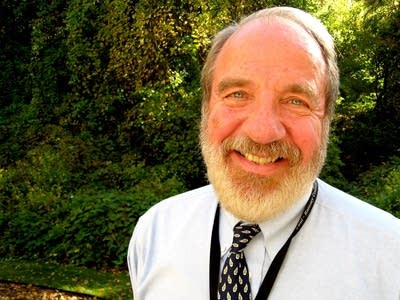After 22 years, Ramsey County's Public Health chief retires
Go Deeper.
Create an account or log in to save stories.
Like this?
Thanks for liking this story! We have added it to a list of your favorite stories.

In his 22 years at the St. Paul-Ramsey County Public Health Department Director Rob Fulton has seen everything from the HIV - AIDS epidemic to last year's H1N1 flu pandemic.
Fulton retired Friday, leaving behind one of the largest and most active county public health departments in the Upper Midwest.
When Fulton came to the St. Paul - Ramsey County Public Health Department in 1988, he didn't have to look far to find his first public health issue.
"When I walked in the door of the public health department there were people in the administrative office who smoked," Fulton said. "One of the first things I did was [saying], 'There will be no more smoking in our office.'"
Turn Up Your Support
MPR News helps you turn down the noise and build shared understanding. Turn up your support for this public resource and keep trusted journalism accessible to all.
That rubbed a few of his employees the wrong way. But Fulton, who had been a smoker for more than 20 years before he quit, reasoned that a public health department couldn't allow smoking on its premises while simultaneously preaching the ills of smoking to the public.
His no smoking edict was just the first of many challenging decisions Fulton would make in the interest of promoting good health practices. He said his work during the HIV/AIDS crisis in the late 1980s really pushed some buttons.
"I produced a brochure with pictures, sketches of how you put on a condom," he said. "They don't come with instructions for the most part."
At the time, Ramsey County had a policy that every brochure that was produced by a county department had to list all of the county commissioners' names on it.
"Sometimes you have to catch a little hell to get what you want."
"And when I took this to my county manager boss, he was just horrified that we were producing this and insisted we not put commissioners names on it," Fulton said.
Fulton complied with the request. Then, a few days later, looking for a way to lighten the mood, he handed his boss a bumper sticker he had made that said 'Real Men Wear Condoms.'
"And I'd taken the 'R' from real and put the Ramsey County 'R' on it and told him I'd made 10,000 bumper stickers. That was a joke," he said.
His knack for diffusing testy situations earned Fulton the admiration of many of his co-workers over the years. When asked recently how his colleagues would describe him, Fulton said he's been called the 'consumate Mr. Nice Guy.'
"I always believe you get more with honey than you do with lemon. So I'm very much into relationships," he said.
But sometimes Fulton's sense of duty has tested those relationships. Last December he challenged the Minnesota Department of Health over its flu vaccine policy.
Fulton had a lot of H1N1 doses and wanted to give them to anyone who wanted them. But the agency told him to stick to the guidelines of only vaccinating high-risk groups, which included mostly children.
"It didn't make a lot of sense to us," Fulton said.
So Fulton defied the agency and announced his clinic would be open to everyone.
"We got chastised by the state," he recalled. "I went to a meeting and we were sort of pointed out as not playing fairly, but we still felt it was a good decision and obviously the state did too because they went and changed it to coincide with our clinic on that Monday. So sometimes you have to catch a little hell to get what you want."
Fulton will leave behind a public health department that is larger and more involved in the community than the one he inherited. When he started in 1988, Fulton had one health educator on staff. Today, he has 15 educators and dozens of nurses who make home visits.
"We do an awful lot of face-to-face. And I still think that's the most effective way of changing behaviors," he said.
Last year, educators and nurses from Fulton's department made 23,000 home visits - more than any other local public health entity in the state. Of those clients, 600 were pregnant and parenting teens.
Fulton said the success stories make his heart sing - especially the unexpected victories.
A few months ago, his department received a complaint about a garbage house in the northwestern part of the county. It belonged to a family with a couple of small kids.
"We went in and the place, people had just gotten, it just overwhelmed them," he said. "You couldn't hardly get through the corridor from the kitchen-living room area back to the bedrooms."
At the rear of the trailer, a stack of garbage blocked the exit. A team of public health workers helped the family clean up the mess.
A few weeks ago, Fulton got a call from an inspector telling him that the trailer had burned down.
"And everyone had gotten out because the back door was not blocked anymore," he said. "The fire had started in the kitchen and they all went out the back entrance. And that's classic public health. Nobody knows that we did something that saved those lives. And if things don't happen, it's because public health is working."
Fulton's plans for retirement are pretty simple. He said after years of keeping up with public health literature, he is looking forward to finally finishing the six partially-read books he has waiting for him at home.



